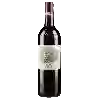
Château FontoyCuvée Les Mirondelles Bordeaux
This wine is a blend of 3 varietals which are the Cabernet franc, the Cabernet-Sauvignon and the Merlot.
This wine generally goes well with poultry, beef or veal.
Food and wine pairings with Cuvée Les Mirondelles Bordeaux
Pairings that work perfectly with Cuvée Les Mirondelles Bordeaux
Original food and wine pairings with Cuvée Les Mirondelles Bordeaux
The Cuvée Les Mirondelles Bordeaux of Château Fontoy matches generally quite well with dishes of beef, veal or game (deer, venison) such as recipes of bernard's potée, veal cutlets parmigiana or duck breast with honey, potato and onion with garlic.
Details and technical informations about Château Fontoy's Cuvée Les Mirondelles Bordeaux.
Discover the grape variety: Cabernet franc
Cabernet Franc is one of the oldest red grape varieties in Bordeaux. The Libourne region is its terroir where it develops best. The terroirs of Saint-Emilion and Fronsac allow it to mature and develop its best range of aromas. It is also the majority in many blends. The very famous Château Cheval Blanc, for example, uses 60% Cabernet Franc. The wines produced with Cabernet Franc are medium in colour with fine tannins and subtle aromas of small red fruits and spices. When blended with Merlot and Cabernet Sauvignon, it brings complexity and a bouquet of aromas to the wine. It produces fruity wines that can be drunk quite quickly, but whose great vintages can be kept for a long time. It is an earlier grape variety than Cabernet Sauvignon, which means that it is planted as far north as the Loire Valley. In Anjou, it is also used to make sweet rosé wines. Cabernet Franc is now used in some twenty countries in Europe and throughout the world.
Informations about the Château Fontoy
The Château Fontoy is one of wineries to follow in Bordeaux.. It offers 3 wines for sale in the of Bordeaux to come and discover on site or to buy online.
The wine region of Bordeaux
Bordeaux, in southwestern France, is one of the most famous, prestigious and prolific wine regions in the world. The majority of Bordeaux wines (nearly 90% of the production Volume) are the Dry, medium and Full-bodied red Bordeaux blends for which it is famous. The finest (and most expensive) are the wines of the great châteaux of Haut-Médoc and the right bank appellations of Saint-Émilion and Pomerol. The former focuses (at the highest level) on Cabernet Sauvignon, the latter on Merlot.
The word of the wine: Seeds
A maximum of four, located in the heart of the grape berry, they contain tannins and nitrogenous matter.











